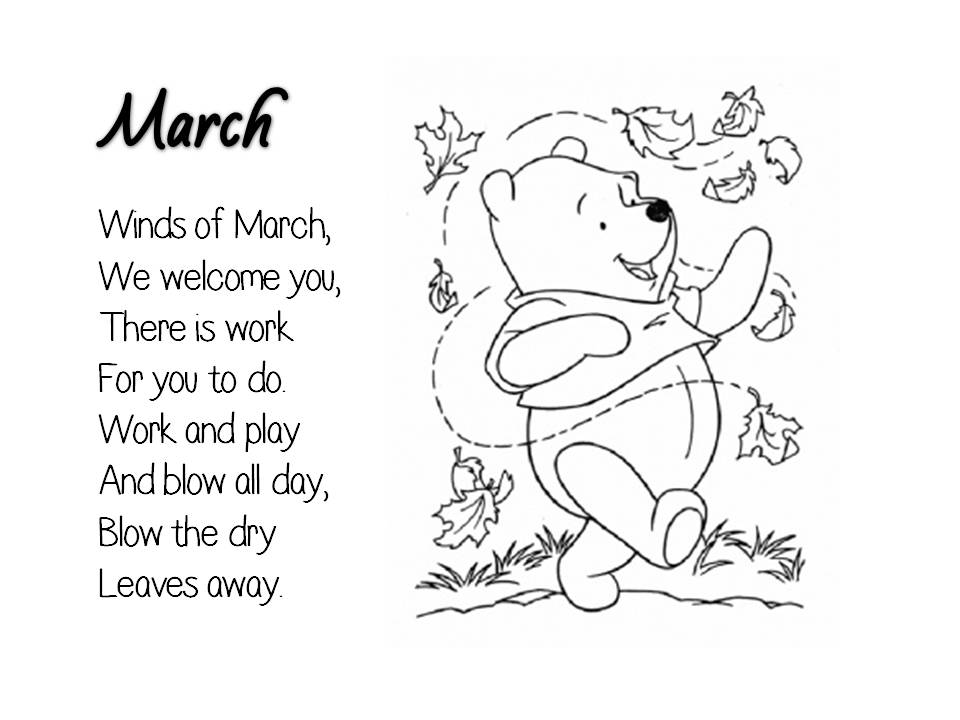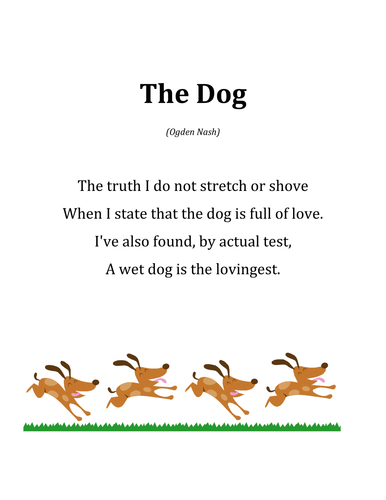Source(Google.com.pk)
Rhyming Poems For Kids Biography
Function of Rhyming words
Rhyme partly seems to be enjoyed simply as a repeating pattern that is pleasant to hear. It also serves as a powerful mnemonic device, facilitating memorization. The regular use of tail rhyme helps to mark off the ends of lines, thus clarifying the metrical structure for the listener. As with other poetic techniques, poets use it to suit their own purposes; for example William Shakespeare often used a rhyming couplet to mark off the end of a scene in a play.
Types of rhyme
The word rhyme can be used in a specific and a general sense. In the specific sense, two words rhyme if their final stressed vowel and all following sounds are identical; two lines of poetry rhyme if their final strong positions are filled with rhyming words. A rhyme in the strict sense is also called a perfect rhyme. Examples are sight and flight, deign and gain, madness and sadness.
Perfect rhymes
Main article: Perfect rhyme
Perfect rhymes can be classified according to the number of syllables included in the rhyme, which is dictated by the location of the final stressed syllable.
- single: a rhyme in which the stress is on the final syllable of the words (rhyme, sublime)
- double: a rhyme in which the stress is on the penultimate (second from last) syllable of the words (picky, tricky)
- dactylic: a rhyme in which the stress is on the antepenultimate (third from last) syllable (cacophonies, Aristophanes)
General rhyme
In the general sense, general rhyme can refer to various kinds of phonetic similarity between words, and to the use of such similar-sounding words in organizing verse. Rhymes in this general sense are classified according to the degree and manner of the phonetic similarity:
- syllabic: a rhyme in which the last syllable of each word sounds the same but does not necessarily contain stressed vowels. (cleaver, silver, or pitter, patter; the final syllable of the words bottle and fiddle are /l/, a liquid consonant.)
- imperfect (or near): a rhyme between a stressed and an unstressed syllable. (wing, caring)
- weak (or unaccented): a rhyme between two sets of one or more unstressed syllables. (hammer, carpenter)
- semirhyme: a rhyme with an extra syllable on one word. (bend, ending)
- forced (or oblique): a rhyme with an imperfect match in sound. (green, fiend; one, thumb)
- assonance: matching vowels. (shake, hate) Assonance is sometimes referred to as slant rhymes, along with consonance.
- consonance: matching consonants. (rabies, robbers)
- half rhyme (or slant rhyme): matching final consonants. (Roxie', Lexie)
- pararhyme: all consonants match. (tell, tall)
- alliteration (or head rhyme): matching initial consonants. (ship, short)
Identical rhymes
Identical rhymes are considered less than perfect in English poetry; but are valued more highly in other literatures such as, for example, rime riche in French poetry.
Though homophones and homonyms satisfy the first condition for rhyming—that is, that the stressed vowel sound is the same—they do not satisfy the second: that the preceding consonant be different. As stated above, in a perfect rhyme the last stressed vowel and all following sounds are identical in both words.
If the sound preceding the stressed vowel is also identical, the rhyme is sometimes considered to be inferior and not a perfect rhyme after all.[2][3] An example of such a super-rhyme or "more than perfect rhyme" is the identical rhyme, in which not only the vowels but also the onsets of the rhyming syllables are identical, as in gun and begun. Punning rhymes, such are bare and bear are also identical rhymes. The rhyme may extend even farther back than the last stressed vowel. If it extends all the way to the beginning of the line, so that there are two lines that sound identical, it is called a holorhyme ("For I scream/For ice cream").
In poetics these would be considered identity, rather than rhyme.
Eye rhyme
Main article: Eye rhyme
Eye rhymes or sight rhymes or spelling rhymes refer to similarity in spelling but not in sound where the final sounds are spelled identically but pronounced differently.[4] Examples in English are cough, bough, and love, move.
Some early written poetry appears to contain these, but in many cases the words used rhymed at the time of writing, and subsequent changes in pronunciation have meant that the rhyme is now lost.
Mind rhyme
Main article: Mind rhyme
Mind rhyme is a kind of substitution rhyme similar to rhyming slang, but it is less generally codified and is “heard” only when generated by a specific verse context. For instance, “this sugar is neat / and tastes so sour.” If a reader or listener thinks of the word “sweet” instead of “sour,” a mind rhyme has occurred.
Classification by position
Rhymes may be classified according to their position in the verse:
- Tail rhyme (also called end rhyme or rime couée) is a rhyme in the final syllable(s) of a verse (the most common kind).
- Internal rhyme occurs when a word or phrase in the interior of a line rhymes with a word or phrase at the end of a line, or within a different line.
- Off-centered rhyme is a type of internal rhyme occurring in unexpected places in a given line. This is sometimes called a misplaced-rhyme scheme or a spoken word rhyme style.
- Holorime, mentioned above, occurs when two entire lines have the same sound.
- Broken rhyme is a type of enjambement producing a rhyme by dividing a word at the line break of a poem to make a rhyme with the end word of another line.
- Cross rhyme matches a sound or sounds at the end of a line with the same sound or sounds in the middle of the following (or preceding) line.
A rhyme scheme is the pattern of rhyming lines in a poem.
Rhyming Poems For Kids About Life About School In Urdu In Hindi About School About Nature About Love About Summer About Fall
Rhyming Poems For Kids About Life About School In Urdu In Hindi About School About Nature About Love About Summer About Fall
Rhyming Poems For Kids About Life About School In Urdu In Hindi About School About Nature About Love About Summer About Fall
Rhyming Poems For Kids About Life About School In Urdu In Hindi About School About Nature About Love About Summer About Fall
Rhyming Poems For Kids About Life About School In Urdu In Hindi About School About Nature About Love About Summer About Fall
Rhyming Poems For Kids About Life About School In Urdu In Hindi About School About Nature About Love About Summer About Fall
Rhyming Poems For Kids About Life About School In Urdu In Hindi About School About Nature About Love About Summer About Fall
Rhyming Poems For Kids About Life About School In Urdu In Hindi About School About Nature About Love About Summer About Fall
Rhyming Poems For Kids About Life About School In Urdu In Hindi About School About Nature About Love About Summer About Fall
Rhyming Poems For Kids About Life About School In Urdu In Hindi About School About Nature About Love About Summer About Fall




No comments:
Post a Comment